The Texas House last week moved towards a showdown with the federal government over who has the authority to control the national border.
State lawmakers passed a bill that would create a Border Protection Unit, a state-level law enforcement agency empowered to “detain” migrants and “repel” them across the border to Mexico.
The passage demonstrates how committed Texas Republicans are to challenging a basic principle undergirding national immigration law: that the federal government, and not the states, has the responsibility for border enforcement.
And it comes amid a raft of different GOP-backed pieces of legislation in the Texas House and Senate all aimed at overturning one Supreme Court decision: Arizona v. U.S, a 5-3 ruling from 2012 which affirmed that the federal government has the sole right to enforce the border.
Right-wing supporters of the bill both inside and outside of state government have been open about what they describe as a chance to have a friendly Supreme Court turn national immigration law on its head.
AJ Louderback, executive director of the Texas Sheriff’s Regional Alliance, has been a vocal advocate of the effort to put in place state laws that trump the federal government’s border enforcement authority, and in an interview with TPM described the legislature’s efforts as a concerted attempt “to force a legal consequence on this,” to “get to a point where the state of Texas has a say in the border situation.”
“It would cause a federal lawsuit, which I think is the ultimate goal here,” he added, saying that he was hoping for a “Texas v. U.S.” case “just like U.S. v. Arizona, to get that before this Supreme Court to get some authority on the border.”
With weeks left in its biennial legislative session, Texas lawmakers are considering a number of different bills which would provide the impetus for the the DOJ to sue the state, setting up the legal battle which Louderback and other Texas immigration restrictionists hope to see.
One bill in the Senate, SB 2424, would establish a state crime for undocumented crossing of the border.
But the bills creating a Border Protection Unit bill, immigration experts say, remain the most extreme pieces of legislation under consideration.
Texas lawmakers last week tanked an earlier version of the bill, HB 20, and reinserted language around creating the law into another proposal called HB 7.
HB 7 does not have one particularly controversial provision that was in HB 20, which would have allowed the state to deputize civilians into its ranks. HB 7 also does not have a declaration by the legislature that the state of Texas has been invaded, language in HB 20 that would have provided Texas — or so immigration restrictionists theorized — with a defense under the U.S. Constitution, which declares that, in the case of an invasion, states can act on their own to defend themselves.
But HB 7 retains provisions that would give its officers the right to arrest and deport migrants to Mexico.
“This is very extreme,” Barbara Hines, a retired immigration rights attorney and founder of the University of Texas Law School immigration clinic, told TPM. “This clearly is a violation of the Supremacy Clause — states do not have the authority to expel people to another country, that is a federal authority under Supreme Court precedent.”
The Border Protection Unit bill, Hines said, is similar to the 2010 Arizona law that the Supreme Court overturned in 2012 in that it mimics some provisions of federal immigration law.
“They’re trying to say that this isn’t preempted because it mimics or tracks a federal statute,” Hines said.
It’s not clear whether the Texas Senate will wholeheartedly embrace the Border Protection Unit as it exists in HB 7. More broadly, the bill aims to codify a lot of what Gov. Greg Abbott (R) has undertaken with Operation Lone Star, Hines said.
State Democrats were reportedly able to extract minor concessions from the bill, including prohibiting detention facilities built under the bill from housing children under 10 years old.







Knowing how our governor operates, he probably wants to “repel” them this way…
We’re heading back to the Articles of Confederation here.
Next, Texas will ask SCOTUS for permission to INVADE Mexico.
And they’ll catch a beating.
Maybe Mexico then can retake Texas? I wouldn’t mind.
Have you ever had a can of cat food hit ya?